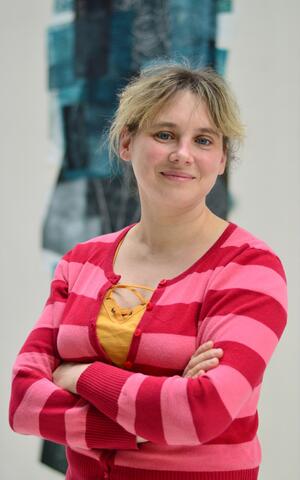Fat cells or nerve cells? New research project on the effects of serotonin on cellular differentiation
Dr. Natalja Alenina Image: MDC
Serotonin is best known for its mood-enhancing effect. Alongside this key role in the central nervous system, the molecule also has a variety of other functions: as a neurotransmitter in blood platelets it stimulates blood clotting and regulates blood pressure, and there is ample evidence to show that it is involved in the development of depressive disorders and obesity.
It is still unclear, however, whether the hormone also plays a role in embryonic development. Dr. Natalia Alenina from the MDC research group “Molecular biology of hormones in the cardiovascular system” will be studying this question in the course of a newly approved research project. “There is plenty of evidence to suggest that it is the case, but we don’t yet understand the mechanisms involved,” says Alenina. The project “Serotonin in stem cell potency and differentiation” will focus on two central questions: What role does serotonin play in the process by which stem cells become differentiated somatic cells, and what therapeutic benefits can we derive from this knowledge?
The researchers will conduct experiments using cell cultures to establish the role of serotonin in the development of stem cells into various cell types.“To do this, we will be using endogenous cells that are initially ‘reprogrammed’ into stem cells,” explains Alenina.These induced pluripotent stem cells (iPS cells) are then specifically differentiated into nerve cells or fat cells, and the effect of serotonin on this process will be examined.The findings from these experiments could help find treatments for diseases such as depression and obesity.
The three participating partners will each contribute their particular expertise to the research work: the MDC as the specialists for serotonin, the Russian group led by Alexej Tomilin (Institute of Cytology of the Russian Academy of Sciences in St. Petersburg) for pluripotent stem cells, and the Ukrainian partner Svitlana Novikova (State Institute of Genetic and Regenerative Medicine of the National Academy of Medical Sciences of Ukraine) for neural crest cells, a stem cell population found in embryonic tissue. Research work will begin in May 2016.
“I am delighted that the Volkswagen Foundation selected our project for funding.This way we can show that scientists from Germany, Russia and Ukraine can keep working together despite the difficult political climate,” says Alenina.
As part of the program “Trilateral Partnerships – Cooperation Projects between Scholars and Scientists from Ukraine, Russia and Germany,” the Volkswagen Foundation is funding 39 projects with a total of EUR 8.6 million in the current funding round.
Contact
Vera Glaßer
Max Delbrück Center for Molecular Medicine (MDC) Berlin-Buch
Head of Communications department (interim)
Tel: 030/94 06 - 2120
presse@mdc-berlin.de






